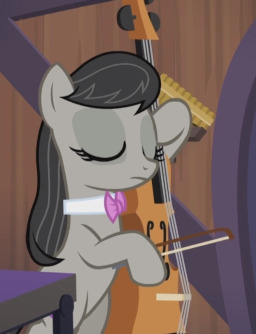
Sonata for Solo Cello in F Minor
Octavia's chest rose and fell as she took deep breaths. Not for any nervousness, simply to let go of any excess tension and make sure her body was in tune like her strings. She gave herself a final examination in the mirror. Her makeup was perfect, as was her mane. Her dress was really a beautiful thing, a dark dusky purple that even her gray coat shone against.
Vinyl whistled. "Lookin' good."
She nodded. She wished Vinyl would word her assessment of her beauty in a more sophisticated way, but Vinyl was a prickly sort of friend. One whose companionship she was glad for, but which she was never quite comfortable with.
Oh she had been cruel to that mare. Vinyl wanted her. She tried to write those affections off as lust, but no matter how much muck she imagined the mare to be covered in, a sliver of love always shone through. Worse still, she was too much of a coward to rebuke her directly. At least she had so far resisted the temptation to accept the mare's offerings.
So, she was beautiful. That was good. But this beauty was only an accent. She was vain enough to enjoy it, but it was not really about her appearance. It was simply necessary that she be beautiful to make beautiful music; a beautiful thing is beautiful in all its parts.
Octavia stood up without a word when the clock marked the time for her to go out. Vinyl offered some friendly words of encouragement.
She went onto the stage and took her seat in the spotlight. Octavia sang. The sound was from the strings of her cello rather than her vocal cords, but between the two, it was her true voice. It was the sound of her soul. Somewhere in the distance, there was a concert house full of enraptured ponies. Their applause would come like thunder at the end, but this the music was the lightning.
Her bow rose and fell as steadily as the breaths in her chest. To play music, to Octavia, was to be alive. She was an artist, and to be a true artist, it was not enough merely to make art, one had to live it. One had to make themselves one with the art. Too few ponies she saw considered what happened, then, when the song ended.
She loved the piece she was playing, it was a brilliant one. On the surface it seemed sorrowful. It was in F minor, a gloomy key if ever there was one, and a cursory reading of the score did nothing to contradict that. Yet, properly played, it was quite the opposite. It defied its apparent nature to celebrate life instead. The finer details were lost on most of the audience, as they always were, but it was reliably inspiring.
When she was a filly, her parents had had a notion that she was going to be a mathematician, or an engineer, or some silly thing like that. Those plans had not lasted long once she showed her aptitude for music, but he had insisted on her taking some lessons in those subjects nonetheless.
She thought of those lessons mostly to scoff at the mathematicians' crude description of her instrument as vibrating strings and frequencies. She had no use for inert symbols on dead paper. Even music was nothing until it was played.
But there was one thing that had stayed with her: the principle of the parabola, that what went up must come down, inevitably come down, always come down. It lurked in music too. No matter what excursions it made every song returned eventually to where it began, else it was not a song.
This was Octavia's most perfect masterpiece. Not one note was out of place. Not one beat a thousandth too long. She could hear how it resonated in the hearts of all her listeners as strongly as it did in hers. It was her peak. And after her peak, the Law of the Parabola said, there was only falling. The cruelest thing was that all this had been laid out before her in advance. For years she had known this day would come, if not exactly when. But the sense of cresting was unmistakable.
She had climbed all her life, honed herself. She had practiced and played until her cello strings had worn grooves in her shoes. But if she achieved perfection, what more was there to do? Every song had a proper place to end. To continue it past then made a lesser song.
Her heart beat faster, but her hooves kept their same steady pace. She knew the music too well to slip. A deliberate flaw remained an unthinkable act of violence. If she maimed one work of art to save another, what had she gained but an even guiltier conscience?
It was harder than one would think to make a mistake. Octavia spent days and weeks practicing, driving herself toward perfection. Music was a divine thing that demanded the utmost from a pony. Committing the music to memory is not only an exercise of the mind; the whole body remembers it, and the spirit. Wood and strings and bone and flesh all vibrated as one.
Octavia had traced the path down the other side many times, she knew what her destiny was. She was determined to use it, to make it part of her art. She would not resist the fall, she would jump.
She could hang herself with a cello string. There would be a unity there, the expression of her life enclosing its end. But those strings were thin enough they were liable to cut her neck and make a bloody mess she did not want. And in her more fantastical moments, she imagined that the strings of her cello were already so deeply braided with the thread of her life that they, recognizing one of their own, would do her no harm. She thought, often, of throwing herself off the mountain like a despairing lover. A quiet plunge into the night. It would be night, of course. There was something improper about killing oneself during the day.
She had been to the city's edge on nights like this one, rehearsing. Though she was a musician, she could appreciate the spacial aspect of it. Behind her, in life, was the city. Canterlot was a work of art in itself, and had inspired a thousand more. Ahead of her was a world flooded in darkness, an emptiness that swallowed all creation. In a word, death. Behind and ahead accorded with past and future.
Her hooves moved as if mechanically, oblivious to the rising fear in her soul. The music was joyous, triumphant, in defiance of its key; death called to her in its strains. As she bowed the final chords, a dissonance jarred her heart. Not from a wrong note, but a right one. She played as she had practiced, to bring out the joy in the music, but the soul that played it now was darkened and twisted with despair, she was disgusted with her own lack of resolve. In short, she had no business playing this piece.
The audience erupted in cheers and applause. That had never been the reason Octavia played, it was that space of time when their hearts beat with hers as she shared herself with them. The noise intensified, as did her failure. They had only heard a pretty noise, not her soul.
She walked back to her dressing room in silence. She put her cello, who had done nothing wrong, back into its case. There was no chance to stare into the mirror and brood on her failure as she would have liked. Vinyl burst in singing her praises.
"Nice job, Tavi. That was great!"
"Of course," Octavia muttered. "But was it perfect?"
Vinyl shrugged. "I dunno. I didn't hear anything I'd change, but eh. I know your standards are a lot higher than mine."
No, in other words.
She resigned herself to live another day.

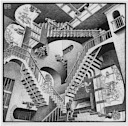






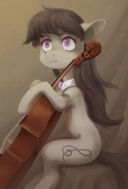

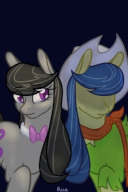
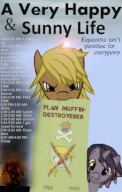


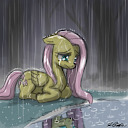







I really like Octavia's depiction here. Too bad for Vinyl but you can really tell that Octavia's sole interest is for her music.
Also, maybe it's the melancholic tone of the story or the talk about death, but it kinda strike a chord in me. ( Pun intended :P )
I'm pretty sure this story will haunt me from time to time.
So, have a fav and a like.
Ich steh mit einem Fuß im Grab,
weil ich grad kein ander'n Schuh hab
Und heute Nacht schwimm' meine Zähne im Glas
Während ich mein' Zauberstab
für deine Oma gimmeln lass
What a shame for someone young to think that they could have reached the highest for of their art. For her to think of willfully discarding all that music that was left to be played. Almost pitiful, how naive and short sighted she is. To talk of death as if she knew it.
As someone who frequently gets terrified when things go the way I want them to, I related far too strongly to this story. You're clearly a very talented writer, and I'd love to read a sequel if you make one.
Anxiety
This is an accurate depiction of how tortured true artists can be. She is trapped; she can't walk away from the music, for it IS her, nor can she ever reach the perfect state she longs for. Though I have no doubt she plays exceptionally, I would not trade places with her for an instant.
That's a new kind of artist anguish if I've ever saw one
Dang, this one is deep as heck and I love it! It really can make ya think about how others truly feel about what they're passionate about or maybe something that they're bothered by because they're too good at it! All of it is just super interesting and got me thinking a lot! I hope ya didn't mind, but I simply HAD to make a reading of this very deep fic of yours!
Audio Linkyloo!: https://youtu.be/TVE0OtOBUIg
(I don't mean to offend anyone with this comment in any way!)
ooof, that hit a bit close to home ngl,
Cash Money
This is definitely going into my favorites. I 100% know what it feels like to play something that others think is good but you know you didn't play it as well as you wished. But hey, at least she didn't play Flight of The Bumblebee.
If ever we reach perfection, what point is there to live? For it is in our imperfections where we are truly alive.
Personally, i think it's more a case of perfection being a false ideal, but i can certainly understand what's being said here.
Sounds like Tavi is a very sick mare.
As a musician myself, this is very bittersweet. Because there is so much competition and because everyone is so invested in learning all that they can, everypony strives for perfection, to be the best of the best, but many once they get there think there is nothing left to learn. But there's always another song waiting to be played.
It is said that in India, Alexander the Great wept, for there were no more worlds to conquer.
There is no perfection, only the pursuit thereof.
For to achieve perfection, one invites stagnation, and thus is inherently imperfect.
That last line, it hit me. I get her, on some level.
This was written impeccably. I love your prose. Each word has a place and a purpose. Perfect narrative clarity.
So there is…
Hello! I recently reviewed this, although I don't think my review really did it justice as I didn't quite have the ability to get Octavia's situation. That is entirely on me, not on you. As I did say, though, this is beautifully written. "Like" isn't quite the right word for a story like this but, sheesh, you have to have one.
This is a very interesting story. Something Goethe or Byron would have liked.
I think I'm going to be talking about this story in the future, because it's illustrative of one of my favorite rants: the fatal seductiveness of the concept of "perfection".
Before Plato, the concept of "perfection" existed only in Sanskrit. It's absurd if you stop and think about it for a few seconds: is there really, even as a hypothetical ideal, a perfect woman? a perfect evening? a perfect performance of a song? Obviously not. It would be pretentious to say that either spring or fall is the best season, or that male or female is the best sex, or Beethoven or Bach the greater composer, or mysteries or adventures the best stories. For anything worth doing or being, there are many good, radically different, and mutually exclusive ways of doing or being it. It would be asinine to say we should throw away the Leonard Cohen version of "Hallelujah" now that we have Jeff Buckley's version. And yet people persist in imagining there could be a "perfect" instance or way of doing something, an eternal ideal Form which all instances must attempt to emulate, and which renders all other instances obsolete.
But few people ever stop and question anything everyone else accepts without question, even for a few seconds.
I can read this story as Octavia's personal tragedy after believing the lie of perfection. You can't play music if you seek perfection. You can accurately play a series of notes, in a dictated pattern, with a given tempo and dynamics. But you can't play. The joy of play, and of infinite, open-ended growth and exploration, is ruled out by the belief in "perfection".
(Can you imagine Louie Armstrong trying to play something "perfectly?" He'd rather play, man.)
Or I can read it as a metaphor for art in general. The belief in perfection (telos, the ancient Greek word which Plato abused to express the concept of "perfect", but which originally meant "mature" or "complete") is the basis of the recurrent claim, by lazy, untalented, or stupid artists, that some form is "played out": that there is nothing left to do with rhymed poetry, or realistic novels, or representational painting, or harmonic music, because they have already attained their true mature Form, which they may not go beyond. Yet this is what the entire art industry proclaims loudly and uniformly. And we see that doing so has destroyed these arts.
I can even read this story as a metaphor for Western civilization's love of death. Its moral prophets so often despise life and its messiness because they demand "perfection". The belief in perfection seems inevitably to lead to embracing death, because it assumes from the start that evolution is impossible. Every species, culture, and individual is expected to grow to just its telic destiny, and no further. Anything more than that is impious. To contemplate being more, or to realize there are many different ways of being good, is unholy, blasphemous. Everyone who seeks "perfection" ultimately embraces death, because perfection is by definition static and unchanging, and hence a kind of death.
I posted a review of this story, which says pretty much the same thing as this comment.
Nitpick: I can't tell whether Octavia composed the piece she plays, or not. It doesn't matter much, but the question is distracting.
Some typos:
=> spatial aspect
There are numerous grammatical errors, but I think most of them are good ones.
10804116
I don't think most good musicians ever think they've "gotten there", or think there's nothing left to learn. Look at the Beatles, Paul Simon, David Bowie. Octavia thinks she's striving for the ultimate, but all she's doing is holding herself back, stuck on this one piece, and never really playing at all anymore. And even if she succeeds in her own mind, her victory will be hollow and fatal. All because she bought into the myth of "perfection".